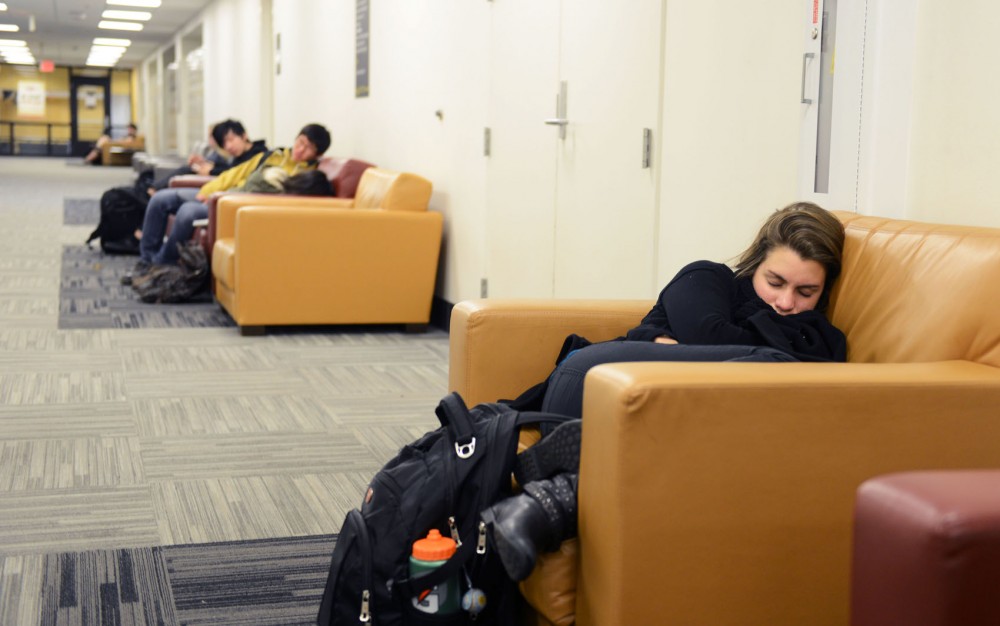Coursework is piling up, professors are prepping for final exams and student sleep schedules are suffering under the weight of academic pressures.
Only about half of Minnesota college students said they felt they get enough sleep three days per week or less, according to a 2012 University of Minnesota Boynton Health Survey.
Students say while they know sleep is important, demands of school can take priority.
Experts say sleep helps the human body repair itself and gives the mind time to make memories, and it may also prevent Alzheimer’s and Parkinson’s diseases, according to a University of Rochester Medical Center study published last month.
In the study, researchers discovered that mice brain cells shrank during sleep, allowing brain fluid to wash away any excess toxins — a common problem for people with Alzheimer’s and Parkinson’s disease.
Many risks are associated with sleep deprivation, including impaired judgment, failed memory and poor verbal and visual reasoning, said Dr. Michael Howell, a University assistant neurology professor who researches sleep medicine.
“Sleep is essentially recharging and revitalizing the brain,” he said. “If you cannot sleep adequately, your brain cannot function adequately.”
When students don’t receive enough sleep, their brain loses this recharge period, which can make daily tasks difficult.
Speech language and hearing sciences sophomore Caitlyn Bralick said she sleeps anywhere from six to nine hours each night. She said she receives less sleep when she has earlier classes the next day — but never pulls all-nighters.
“I don’t enjoy getting less sleep,” she said, “because if I feel really tired in class, I won’t be able to keep my eyes open, and that really annoys me.”
In terms of academic performance, Howell said, students who have a stable sleep schedule will perform better.
“Consistency is really the key,” he said. “All-nighters are a bad idea. … The benefits you’re going to get from staying up all night studying are vastly outweighed by the deficits you’ll get performing on the test.”
Biology senior Co Duong said he pulls an all-nighter every Sunday since most of his papers and tests are on Mondays. After getting no sleep, he said, it’s difficult to remember things that happened.
“It hinders critical thinking,” he said. “I can study more, but at a slower rate.”
Instructor Sarah Keene, who teaches an online course called Success Over Stress, said sleep deprivation impacts students’ ability to focus and retain information, which can create more stress for students.
“Generally, all-nighters make me feel more stressed,” Asian languages and literatures junior Eric Suter said. “I feel awful after. I have trouble organizing my thoughts, and it’s hard to convey the right words or ideas.”
One way students can avoid sleep deprivation, Keene said, is to plan their schedules ahead of time.
Howell said that in general, 8.5 hours of sleep each night is ideal, but students should try to find out when their body wants to go to sleep so they can wake up naturally.
Some students said although they’d like to have a consistent sleep pattern, they can’t because of classes and other commitments.
“School is all over the place,” communications senior Kevin Martin said, “and it’s hard to develop a set schedule.”
To make up for a lack of sleep, some students will take naps throughout the day. Doung said his naps sometimes last up to three hours.
Public health instructor Jerri Kjolhaug said that although naps can be helpful, students should only take them for an hour and not past the early afternoon.
Students also benefit from getting more sleep because it’s an important part of the memory process, Howell said.
“One of the best things you can do is sleep right after you learn something,” he said. “Whether or not that’s a nap after class or studying right before you go to bed, [sleep] is the period of time the brain processes information.”











